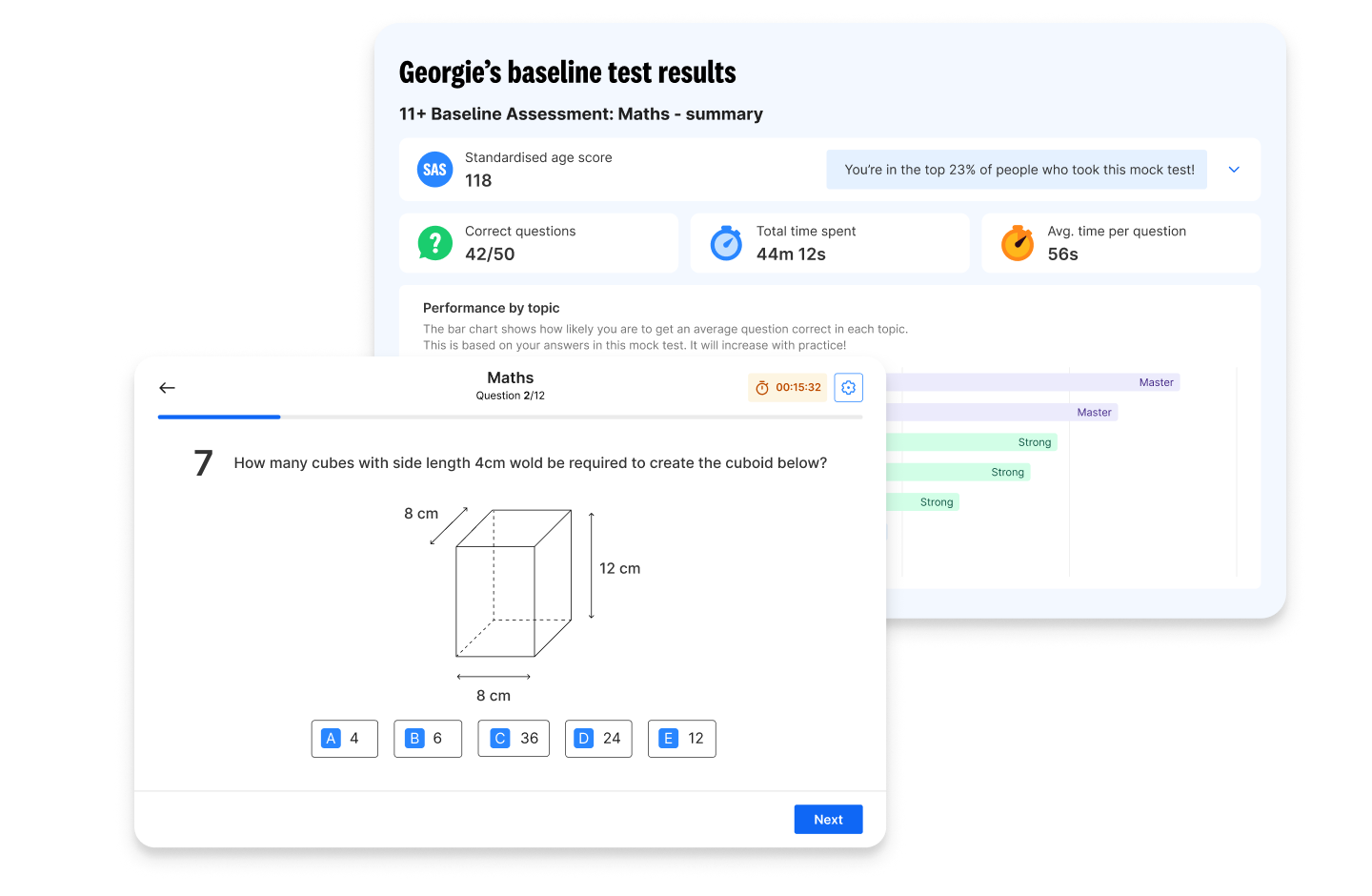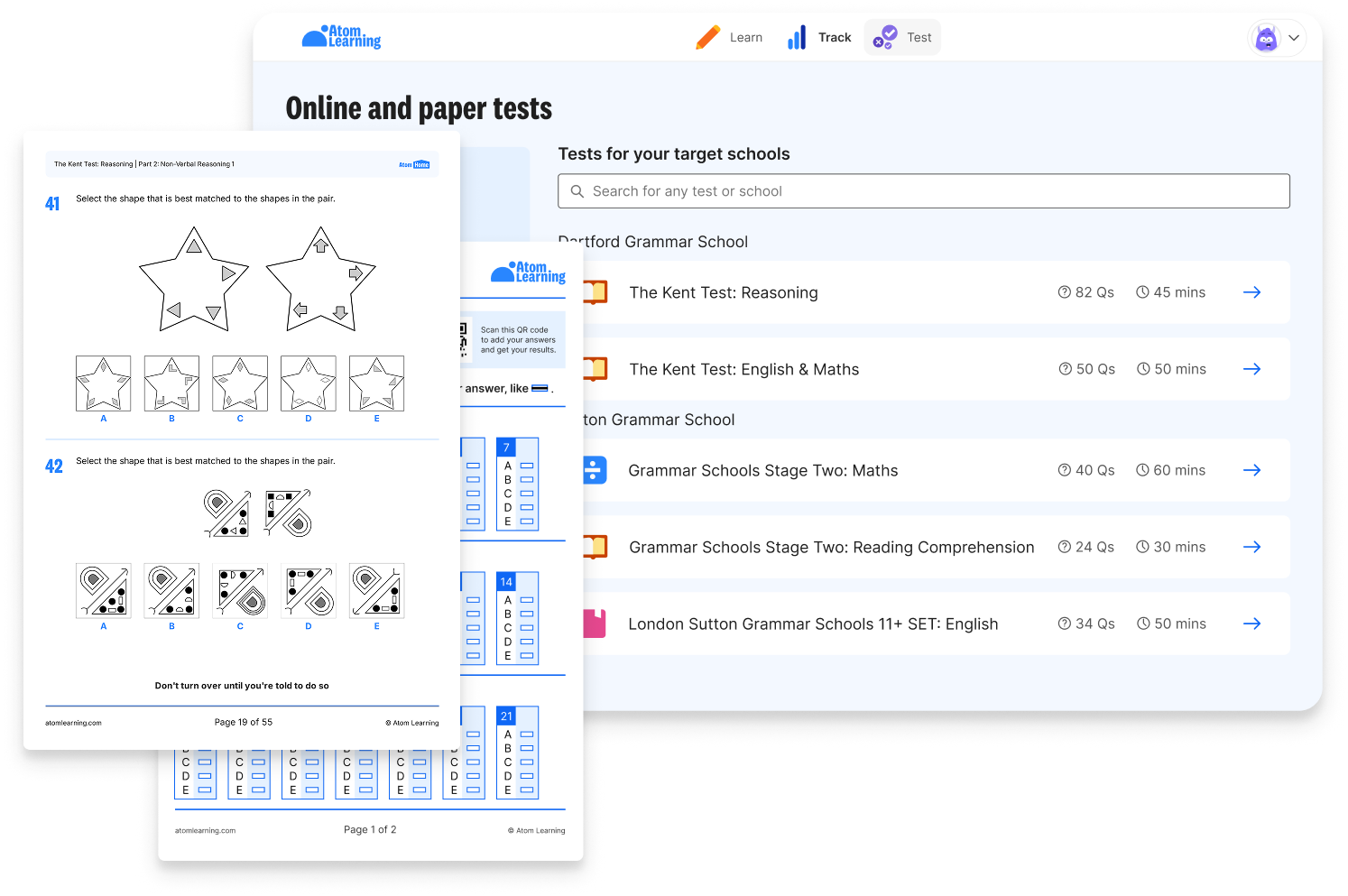Reading School 11+ guide

Are you thinking about applying to Reading School? Find out everything you need to know about the entry process and how to prepare for the 11+ exam.
Key information for Reading School
- School type: boys’ grammar school
- Location: Reading, Berkshire
- Admissions contact: [email protected]
- Number of places in Year 7: 150 (138 day places and 12 boarding places)
- 11+ exam: FSCE 11 plus
- Catchment area: yes
Important dates for 2027 entry
- Wednesday 25th March 2026: Open Day (booking required – details available in the Open Day section on the school website)
- Wednesday 25th March 2026: test registration opens
- Sunday 17th May 2026: test registration closes
- Sunday 12th July 2026: Sporting Aptitude Assessment
- Wednesday 15th July 2026: Test date for SEN applicants
- Thursday 16th July 2026: Testing date for Day and Boarding applicants
- Friday 25th September 2026: Test date for Day applicants living outside the catchment area
- Mid-October 2026: Results available online
- Saturday 31st October 2026: deadline to apply for secondary school places
- Monday 1st March 2027: secondary school national offers day
How to apply to Reading School
Reading School is selective. This means that your child will need to take the 11+ exam to be eligible for a place.
Reading School uses its own entrance exam to select pupils for Year 7. If you would like your child to be considered for a place, you must register them to sit the Reading School Entrance Exam during the registration window via Reading School’s website.
The Reading School Entrance Exam for Day and Boarding applicants will take place on Thursday 16th July 2026. You will be sent details about the test location, timings, and what your child needs to bring before the exam day.
Your child’s results will be shared in mid-October. If they meet the required standard, you can apply for a place by naming Reading School on your common application form. This must be submitted to your local authority by Saturday 31st October 2026.
Important note: passing the test does not guarantee that your child will be allocated a place at Reading School. The school is typically oversubscribed with children who meet the required standard. After the 31st October deadline, places are allocated using the school’s admissions criteria.
We’ve outlined the process for Reading School below.
What will my child be tested on?
Children applying to Reading School take an 11 plus exam provided by Future Stories Community Enterprise (FSCE). This exam board is a subsidiary of Reading School.
It tests the application of knowledge and skills from KS2 subjects taught up to and including the Year 5 programme of study.
Subjects tested may include any of the following:
- Art & Design
- Computing
- Design & Technology
- English
- Geography
- History
- Languages
- Mathematics
- Music
- Physical Education
- Science
The test consists of both multiple-choice and written-response questions. The type of questions, subjects, content and format will change from year to year.
What is the sporting aptitude test at Reading School?
The sporting aptitude assessment is taken by children applying for a place on the Reading School Kenwrick Sports Pathway (KSP). Up to 15 places are available on the pathway.
The sporting aptitude assessment will take place on Sunday 12th July 2026. Children will have the opportunity to demonstrate their sporting potential through a variety of tests and tasks. These are overseen by an independent assessor.
Scores will be awarded for each element of the assessment. When all the assessments are complete, a rank order of applicants for the sporting aptitude places will be produced and a threshold applied.
Please note that children are only eligible for a sporting aptitude place if they:
- Have achieved eligible scores in the FSCE entrance tests
- Have surpassed the threshold for the sporting aptitude assessment
- Live within the catchment area (day places)
Is your child ready for the 11+?
See where they stand in minutes. Atom’s free 11+ baseline tests give you an instant breakdown of their strengths and gaps. Know exactly what to focus on next and start preparing with direction, not uncertainty.

How are places allocated at Reading School?
In mid-October, you’ll receive your child’s test results. Children who achieve the required standard in the Reading School Entrance Exam are eligible to apply for a place in Year 7.
To be considered, you must name Reading School as a preferred school on your common application form. This must be submitted to your home local authority by the 31st October deadline.
If more children meet the required standard than there are available places, Reading School applies its oversubscription criteria. These are set out in full in the school’s admissions policy.
Does Reading School have a catchment area?
Yes. Reading School has a defined catchment area.
The catchment area covers the following postcodes:
- RG1, RG2, RG4, RG5, RG6, RG7, RG8, RG10, RG12, RG18, RG19, RG30, RG31, RG40, RG41, RG42 and RG45
- RG9 1, RG9 2, RG9 3, RG9 4 and RG9 5
- RG14 1, RG14 2, RG14 3, RG14 5, RG14 6 and RG14 7
- RG20 4, RG20 5, RG20 6 and part of RG20 7 (east of A34)
- RG26 3, RG26 4 and part of RG26 5 (north of A339)
- RG27 0 and parts of RG27 8 and RG27 9 (north of M3)
- GU15 1, GU15 2, GU15 3 and GU15 4
- GU17 0 and GU17 9
- GU19 5
- GU46 6 and GU46 7
- GU47 0, GU47 8 and GU47 9
- OX10 0, OX10 8, OX10 9 and part of OX10 6 (south of A4130)
- OX11 9
- SL4 4
- SL5 0, SL5 7, SL5 8 and SL5 9
If a tie-break is required, priority is typically given according to the school’s oversubscription criteria, which may include distance from the school.
If you live further away, it’s important to think carefully about the daily journey. Consider how long the journey will take, what transport options are available, and whether the routine will be manageable for your child.
A longer or more complex commute can affect homework time, rest, and participation in after-school activities, so it’s worth factoring this into your decision early on.
How can I help my child prepare for the test?
The Reading School Entrance Exam can feel like a significant milestone, but preparation does not need to be overwhelming. Here are some practical ways to support your child.
Stay on track with a clear plan
One of the hardest parts of 11+ preparation is knowing what to focus on, when, and how to make steady progress without it taking over family life.
A clear, structured plan helps your child feel less overwhelmed and more in control. It ensures they build skills in the right order, cover everything they need, and avoid last-minute cramming.
Atom’s exam plan makes this easier. Enter your child’s exam date and target schools, and we’ll create a personalised weekly plan tailored to the topics they’ll be tested on. It shows them what to work on and when, adapts as they improve, and helps them build progress in a calm, manageable way — little and often.
That means less guesswork for you, less stress for them, and a clearer path all the way to exam day.
Build smart exam technique
As your child’s knowledge grows, practice tests can help them feel more comfortable with the real exam format.
Atom’s 11+ practice papers are exact replicas of real 11+ exams. They’re also unlimited – you can download the same paper again and again, and your child will get new questions each time. This helps them practise without repeating the same content.
We’ve made marking easy for you, too. Simply photograph your child’s answer sheets and upload them to Atom. The papers are marked instantly, showing your child’s standardised age score (SAS), where they’re doing well, and what they should focus on next. You’ll also learn how they compare to other children applying to the same school.
Encourage regular reading
Strong reading skills play a big role in 11+ preparation.
Encourage your child to read every day, even for just 10–15 minutes. The key is variety. Mix fiction and non-fiction, different genres, and a range of authors. This helps them become more confident in understanding tone, purpose, and meaning across different texts.
Over time, regular reading will:
- broaden their vocabulary
- improve comprehension and inference
- build confidence in tackling unseen texts
And just as importantly, it can help them enjoy reading — not just see it as exam preparation.
Looking for inspiration? Atom’s recommended reading lists have suggestions spanning fiction and non-fiction for Years 3–6.
Celebrate progress, not just scores
When you’re supporting your child through 11+ preparation, what really matters is knowing they’re moving in the right direction — not just how they scored on a single test.
Atom’s progress tracking gives you a clear, simple picture of how your child is doing in each topic and the direction they’re moving in. You can see where they’re on track, where they might need more practice, and spot progress as it happens.
That makes it easier to give meaningful encouragement, keep motivation steady, and focus on what matters most: consistent improvement, not just one-off results.
Take control of your child’s 11+ preparation.

Not sure if your child is on track for the grammar school 11+? You don’t need to guess what to cover or whether they’re ready. Atom shows you exactly what to practise each week and how they’re performing, so you can stay ahead of the process without the stress.
- Follow personalised weekly exam plans that show them what to learn next.
- Download replica 11+ practice papers and upload a photo for instant, stress-free marking.
- Track progress and see how they compare to others applying to the same schools.
Start your free trial and help your child feel fully prepared for the 11+.




